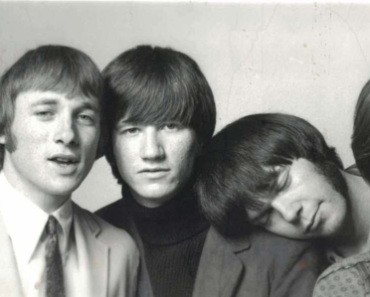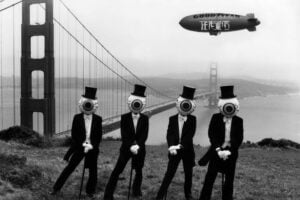
Feature Photo: Niranjan Arminius, CC BY-SA 4.0 <https://creativecommons.org/licenses/by-sa/4.0>, via Wikimedia Commons
Birtha emerged from the Los Angeles and Orange County music scene in the late 1960s, bringing together a lineup that would soon gain a reputation for their skill and energy. Guitarist Michele “Shele” Pinizzotto, bassist Rosemary Butler, and keyboardist Sherry Hagler had already been performing together since their high school years, first in the Fullerton-based all-female group the Ladybirds and later in another all-female act, the Daisy Chain. The Daisy Chain recorded the album Straight or Lame in 1967 before disbanding the following year. Not long after, Pinizzotto and Butler formed a new project that would become Birtha, eventually joined by drummer Olivia “Liver” Favela in 1968.
Once the four-member lineup was solidified, Birtha began booking club dates across the West Coast, from California to Alaska. Their sets combined sharp musicianship with a developing catalog of original material, much of it written by the band members themselves, with occasional outside contributions from songwriters such as Mark Wickman and Gabriel Mekler. Pinizzotto’s brother, Michael, took on management duties, helping the group build momentum over their first few years together. By 1971, their songwriting had matured to the point where a debut album became the next logical step.
In 1972, Birtha signed with Dunhill Records and recorded their first full-length, self-titled album with producer Gabriel Mekler. That same year, they began extensive touring throughout the United States, Canada, and Europe. Their time on the road included a notable UK tour with the Kinks, promoted with the controversial tagline “Birtha has balls.” The group also appeared on the BBC television program The Old Grey Whistle Test during this period. Back in Los Angeles, their homecoming performances often took place at well-known venues such as Whisky a Go Go, The Troubadour, and the Sopwith Camel in Glendale.
The second Birtha album, Can’t Stop the Madness, arrived in 1973 with Christopher Huston producing. This release was followed by an even more grueling tour schedule—over 250 dates a year—sharing stages with a diverse range of acts that included Fleetwood Mac, Alice Cooper, Poco, Black Oak Arkansas, Cheech & Chong, B.B. King, Three Dog Night, and the James Gang. The band’s tight musicianship and vocal harmonies became their signature, but despite their relentless work ethic, commercial success remained limited.
By 1975, after years of near-constant travel and performance, Birtha disbanded. Their music, however, retained a presence well beyond their active years. In 2013, their track “Too Much Woman for a Hen Pecked Man” was featured in the Spanish film Perdedores Natos (Natural Born Losers), directed by Chris A. Jiménez, introducing their sound to a new audience decades after the group’s dissolution.
The members’ later years brought sad news for fans. Olivia “Liver” Favela, born April 6, 1950, in Joliet, Illinois, passed away on June 1, 2011. Michele “Shele” Pinizzotto, born April 2, 1947, in Artesia, California, died on February 4, 2014. Rosemary Butler and Sherry Hagler have largely stepped away from the spotlight, but their contributions to one of the 1970s’ most skilled all-female rock outfits remain documented in the two studio albums they recorded.
- All This Love – Can’t Stop The Madness – 1973
- Can’t Stop The Madness – Can’t Stop The Madness – 1973
- Don’t Let It Get You Down – Can’t Stop The Madness – 1973
- Feeling Lonely – Birtha – 1972
- Fine Talking Man – Birtha – 1972
- Forgotten Soul – Birtha – 1972
- Free Spirit – Birtha – 1972
- Freedom – Can’t Stop The Madness – 1973
- Judgement Day – Birtha – 1972
- Let Us Sing – Can’t Stop The Madness – 1973
- My Man Told Me – Can’t Stop The Madness – 1973
- My Pants Are Too Short – Can’t Stop The Madness – 1973
- Rock Me – Can’t Stop The Madness – 1973
- She Was Good To Me – Birtha – 1972
- Sun – Can’t Stop The Madness – 1973
- Too Much Woman (For A Hen Pecked Man) – Birtha – 1972
- Tuesday – Birtha – 1972
- (When Will Ya) Understand – Can’t Stop The Madness – 1973
- Work On A Dream – Birtha – 1972
Albums
Birtha (1972): 9 songs
Can’t Stop The Madness (1973): 10 songs
Check out similar articles and more…all on ClassicRockHistory.com
The Story Of The All-Female ’70s Group Birtha And Their Best Songs
Read More: Artists’ Interviews Directory At ClassicRockHistory.com
Read More: Classic Rock Bands List And Directory





































